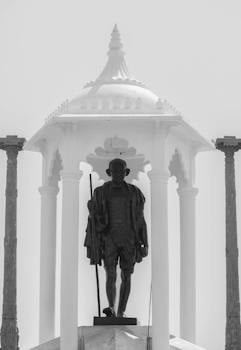

-
Table of Contents
The Life and Legacy of Mahatma Gandhi: Inspiring Peaceful Change
Introduction
Mahatma Gandhi, born on October 2, 1869, in Porbandar, India, was a prominent leader in the Indian independence movement against British rule. Known for his philosophy of nonviolent resistance, Gandhi played a crucial role in India's struggle for freedom. His legacy extends beyond India, inspiring civil rights movements and leaders worldwide. Gandhi's teachings on peace, justice, and equality continue to resonate, making him an iconic figure in the history of the 20th century.
The Early Life and Influences of Mahatma Gandhi
The life and legacy of Mahatma Gandhi is one that continues to inspire people around the world. Born on October 2, 1869, in Porbandar, India, Gandhi grew up in a devout Hindu family. His father, Karamchand Gandhi, served as the diwan, or prime minister, of Porbandar, and his mother, Putlibai, was a deeply religious woman. From an early age, Gandhi was exposed to the teachings of Hinduism and Jainism, which would greatly influence his later philosophy of nonviolence.
Gandhi's early years were marked by a strong sense of duty and a desire to make a difference in the world. He was an average student but showed a keen interest in social issues. At the age of 13, he was married to Kasturba Makhanji, who would become his lifelong partner and supporter. Despite his young age, Gandhi took his marriage vows seriously and remained faithful to his wife throughout their marriage.
In 1888, Gandhi traveled to London to study law. This was a transformative period in his life, as he was exposed to new ideas and experiences. He became involved in the Vegetarian Society and the Theosophical Society, which introduced him to the principles of nonviolence and the concept of universal brotherhood. These ideas resonated deeply with Gandhi and would shape his future activism.
After completing his studies in London, Gandhi returned to India in 1891 and began practicing law in Bombay. However, he soon realized that his true calling lay in fighting for justice and equality. In 1893, he accepted a one-year contract to work as a legal advisor in South Africa. Little did he know that this decision would have a profound impact on his life and the world.
During his time in South Africa, Gandhi experienced firsthand the discrimination and racism faced by the Indian community. He was appalled by the treatment of Indians and resolved to fight for their rights. Gandhi became actively involved in the Indian community's struggle for equality, organizing protests and advocating for their rights. It was during this time that he developed his philosophy of satyagraha, or nonviolent resistance, as a means of achieving social and political change.
Gandhi's experiences in South Africa shaped his approach to activism and laid the foundation for his later work in India. He believed in the power of nonviolence to bring about lasting change and was committed to fighting for justice and equality for all. Gandhi's time in South Africa also deepened his understanding of the importance of self-discipline and self-sacrifice in the pursuit of truth and justice.
In 1915, Gandhi returned to India and immediately became involved in the struggle for independence from British rule. He organized campaigns of nonviolent resistance, including boycotts and strikes, to protest against British policies. Gandhi's leadership and commitment to nonviolence inspired millions of Indians to join the freedom struggle.
Throughout his life, Gandhi remained true to his principles of nonviolence and truth. He believed that individuals had the power to change the world through their actions and that true freedom could only be achieved through self-discipline and self-sacrifice. Gandhi's legacy continues to inspire people around the world to fight for justice and equality, and his philosophy of nonviolence remains a powerful tool for social and political change.
In conclusion, the early life and influences of Mahatma Gandhi played a crucial role in shaping his later activism and philosophy. From his upbringing in a devout Hindu family to his experiences in South Africa, Gandhi's journey was one of self-discovery and transformation. His commitment to nonviolence and his unwavering belief in the power of truth continue to inspire people to this day. Gandhi's life and legacy serve as a reminder that one person can make a difference and that the pursuit of justice and equality is a lifelong journey.
Gandhi's Role in India's Independence Movement

Mahatma Gandhi, also known as Mohandas Karamchand Gandhi, was a prominent figure in India's struggle for independence from British rule. His role in the independence movement was instrumental, and his nonviolent approach to resistance became a powerful tool for change.
Gandhi's involvement in the independence movement began in the early 20th century when he returned to India after spending many years in South Africa. He quickly became a prominent leader and advocate for the rights of Indians. Gandhi believed in the power of nonviolence and civil disobedience as a means to achieve political and social change.
One of Gandhi's most significant contributions to the independence movement was his leadership in the Salt March of 1930. This act of civil disobedience was a protest against the British monopoly on salt production and distribution. Gandhi and his followers marched over 240 miles to the Arabian Sea, where they made their own salt by evaporating seawater. This act not only challenged British authority but also inspired millions of Indians to join the fight for independence.
Gandhi's philosophy of nonviolence, or ahimsa, was a central tenet of his approach to resistance. He believed that violence only perpetuated more violence and that true change could only be achieved through peaceful means. This philosophy influenced not only the independence movement but also other civil rights movements around the world, including the American civil rights movement led by Martin Luther King Jr.
Gandhi's nonviolent approach to resistance was not without its challenges. He faced opposition from both the British colonial government and some factions within the Indian independence movement. However, Gandhi remained steadfast in his commitment to nonviolence, even in the face of violence and repression.
One of the most significant events in Gandhi's role in the independence movement was the Quit India Movement of 1942. This mass civil disobedience campaign called for the immediate withdrawal of British rule from India. Gandhi's call for nonviolent resistance inspired millions of Indians to join the movement, leading to widespread protests and strikes across the country. Although the movement was met with harsh repression from the British government, it marked a turning point in the struggle for independence.
Gandhi's role in the independence movement extended beyond his leadership in protests and campaigns. He also played a crucial role in negotiating with the British government for India's independence. Gandhi participated in several rounds of talks with British officials, advocating for the rights and interests of the Indian people. His unwavering commitment to nonviolence and his ability to mobilize millions of Indians made him a formidable force in these negotiations.
Gandhi's legacy in India's independence movement is undeniable. His nonviolent approach to resistance inspired generations of activists and leaders around the world. His philosophy of ahimsa continues to be a guiding principle for those fighting for justice and equality. Gandhi's role in the independence movement was not only instrumental in achieving India's freedom but also left a lasting impact on the world stage.
In conclusion, Mahatma Gandhi's role in India's independence movement was pivotal. His leadership, philosophy of nonviolence, and ability to mobilize millions of Indians were instrumental in achieving India's freedom from British rule. Gandhi's legacy as a leader and advocate for justice and equality continues to inspire people around the world. His life and work serve as a reminder of the power of peaceful resistance in the face of oppression.
Gandhi's Philosophy of Nonviolence and its Impact
Mahatma Gandhi, the revered leader of the Indian independence movement, is widely known for his philosophy of nonviolence and its profound impact on the world. Gandhi's belief in nonviolence, also known as ahimsa, was not merely a political strategy but a way of life that he practiced and preached throughout his entire existence.
Gandhi's philosophy of nonviolence was deeply rooted in his spiritual beliefs and his understanding of the interconnectedness of all beings. He believed that violence only begets more violence and that true change can only be achieved through peaceful means. Gandhi saw nonviolence as a powerful force that could transform not only individuals but also societies and nations.
One of the most significant examples of Gandhi's commitment to nonviolence was the Salt March, which took place in 1930. In protest against the British monopoly on salt production, Gandhi led a march of thousands of Indians to the Arabian Sea, where they made their own salt by evaporating seawater. This act of civil disobedience was a powerful demonstration of nonviolent resistance and inspired countless others to join the struggle for independence.
Gandhi's philosophy of nonviolence also had a profound impact on the civil rights movement in the United States. Figures like Martin Luther King Jr. and Rosa Parks were deeply influenced by Gandhi's teachings and applied his principles of nonviolence in their own fight against racial injustice. Gandhi's message of peaceful resistance resonated with people around the world who were struggling against oppression and injustice.
Moreover, Gandhi's philosophy of nonviolence extended beyond political struggles. He believed in the power of nonviolence in resolving conflicts at all levels, from personal relationships to international disputes. Gandhi emphasized the importance of dialogue, understanding, and empathy in resolving conflicts peacefully. He believed that violence only perpetuates hatred and division, while nonviolence fosters understanding and reconciliation.
Gandhi's philosophy of nonviolence was not without its critics. Some argued that nonviolence was a passive and ineffective approach, especially in the face of brutal regimes. However, Gandhi's nonviolence was far from passive. It required immense courage, discipline, and self-sacrifice. Gandhi himself was imprisoned multiple times and endured countless hardships in his pursuit of freedom and justice.
The legacy of Gandhi's philosophy of nonviolence continues to inspire and guide people today. His teachings have been applied in various movements for social justice, including the fight against apartheid in South Africa and the struggle for democracy in Myanmar. Gandhi's message of nonviolence remains relevant in a world plagued by violence and conflict, reminding us of the power of compassion, understanding, and peaceful resistance.
In conclusion, Mahatma Gandhi's philosophy of nonviolence had a profound impact on the world. His belief in the power of peaceful resistance inspired countless individuals and movements for social justice. Gandhi's teachings continue to guide us in our quest for a more just and peaceful world, reminding us that true change can only be achieved through nonviolence and compassion.
Q&A
1. Who was Mahatma Gandhi?
Mahatma Gandhi was a prominent leader of the Indian independence movement against British rule in the early 20th century.
2. What were some of Gandhi's key beliefs and principles?
Gandhi believed in nonviolent resistance, civil disobedience, and the power of truth and love. He advocated for social justice, equality, and the eradication of untouchability in Indian society.
3. What is Mahatma Gandhi's legacy?
Gandhi's legacy includes his instrumental role in India's independence, his influence on civil rights movements worldwide, and his teachings on nonviolence and peaceful resistance. He is widely regarded as one of the most important figures in the 20th century.
Conclusion
In conclusion, Mahatma Gandhi was a prominent leader and advocate for nonviolent resistance during India's struggle for independence. His philosophy of Satyagraha, or truth force, inspired millions and continues to be influential today. Gandhi's legacy is characterized by his commitment to social justice, equality, and peace, making him a revered figure in the history of India and the world.












